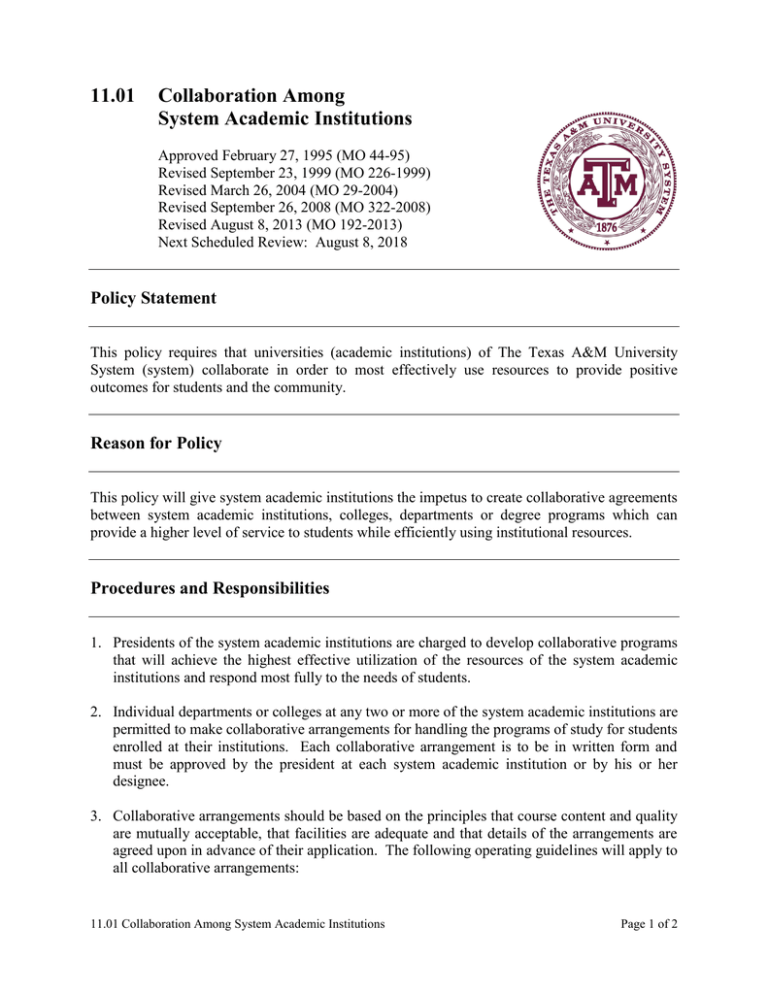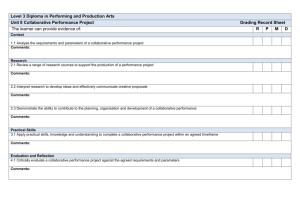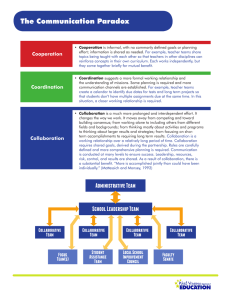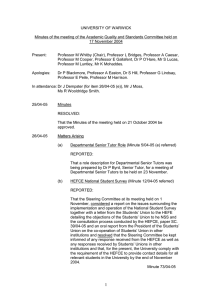11.01 Collaboration Among System Academic Institutions
advertisement

11.01 Collaboration Among System Academic Institutions Approved February 27, 1995 (MO 44-95) Revised September 23, 1999 (MO 226-1999) Revised March 26, 2004 (MO 29-2004) Revised September 26, 2008 (MO 322-2008) Revised August 8, 2013 (MO 192-2013) Next Scheduled Review: August 8, 2018 Policy Statement This policy requires that universities (academic institutions) of The Texas A&M University System (system) collaborate in order to most effectively use resources to provide positive outcomes for students and the community. Reason for Policy This policy will give system academic institutions the impetus to create collaborative agreements between system academic institutions, colleges, departments or degree programs which can provide a higher level of service to students while efficiently using institutional resources. Procedures and Responsibilities 1. Presidents of the system academic institutions are charged to develop collaborative programs that will achieve the highest effective utilization of the resources of the system academic institutions and respond most fully to the needs of students. 2. Individual departments or colleges at any two or more of the system academic institutions are permitted to make collaborative arrangements for handling the programs of study for students enrolled at their institutions. Each collaborative arrangement is to be in written form and must be approved by the president at each system academic institution or by his or her designee. 3. Collaborative arrangements should be based on the principles that course content and quality are mutually acceptable, that facilities are adequate and that details of the arrangements are agreed upon in advance of their application. The following operating guidelines will apply to all collaborative arrangements: 11.01 Collaboration Among System Academic Institutions Page 1 of 2 3.1 Program arrangements must be consistent with authorities for degree programs and course inventories established by the Texas Higher Education Coordinating Board. 3.2 The student may maintain registration at either system academic institution. If credit for any course or work taken at a secondary system academic institution is to be through student registration in an appropriate course at the primary system academic institution (such as graduate special problems), the dean or other appropriate official of the secondary system academic institution will certify the course grade to the dean or other appropriate official of the primary system academic institution by letter or by form adopted for this purpose. 3.3 Students doing work at a secondary system academic institution will comply with all appropriate rules of the secondary system academic institution as applicable. 3.4 Students will pay all applicable fees at the system academic institution at which they register as outlined in the collaborative agreement. 3.5 Students on a fellowship or in receipt of financial assistance at the primary system academic institution may continue receiving such assistance, if otherwise appropriate, while doing research in a laboratory or taking courses at a secondary system academic institution. 3.6 Where appropriate, collaborating departments will agree on matters which will facilitate the collaboration, such as: (a) use of faculty between system academic institutions for teaching courses or for serving on examining committees; (b) joint filing of degree plans; (c) waiver of transfer credit restrictions; (d) creating financial aid consortiums to allow students to remain eligible for financial aid based upon total semester credit hour enrollment between the system academic institutions; and (e) other items germane to the particular program situation. Member Rule Requirements No rule is required to supplement this policy. Contact Office Office of Academic Affairs (979) 458-6072 11.01 Collaboration Among System Academic Institutions Page 2 of 2




